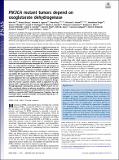PIK3CA mutant tumors depend on oxoglutarate dehydrogenase
Author(s)
Ilic, Nina; Birsoy, Kıvanç; Aguirre, Andrew J.; Singh, Shambhavi; Moody, Susan E.; DeAngelo, Joseph D.; Spardy, Nicole A.; Freinkman, Elizaveta; Weir, Barbara A.; Tsherniak, Aviad; Cowley, Glenn S.; Root, David E.; Asara, John M.; Vazquez, Francisca; Widlund, Hans R.; Hahn, William C.; Kory, Nora; Sabatini, David; Pacold, Michael Edward; ... Show more Show less
DownloadIlic-2017-PIK3CA mutant tumors depend on oxogl.pdf (2.071Mb)
PUBLISHER_POLICY
Publisher Policy
Article is made available in accordance with the publisher's policy and may be subject to US copyright law. Please refer to the publisher's site for terms of use.
Terms of use
Metadata
Show full item recordAbstract
Oncogenic PIK3CA mutations are found in a significant fraction of human cancers, but therapeutic inhibition of PI3K has only shown limited success in clinical trials. To understand how mutant PIK3CA contributes to cancer cell proliferation, we used genome scale loss-of-function screening in a large number of genomically annotated cancer cell lines. As expected, we found that PIK3CA mutant cancer cells require PIK3CA but also require the expression of the TCA cycle enzyme 2-oxoglutarate dehydrogenase (OGDH). To understand the relationship between oncogenic PIK3CA and OGDH function, we interrogated metabolic requirements and found an increased reliance on glucose metabolism to sustain PIK3CA mutant cell proliferation. Functional metabolic studies revealed that OGDH suppression increased levels of the metabolite 2-oxoglutarate (2OG). We found that this increase in 2OG levels, either by OGDH suppression or exogenous 2OG treatment, resulted in aspartate depletion that was specifically manifested as auxotrophy within PIK3CA mutant cells. Reduced levels of aspartate deregulated the malate-aspartate shuttle, which is important for cytoplasmic NAD + regeneration that sustains rapid glucose breakdown through glycolysis. Consequently, because PIK3CA mutant cells exhibit a profound reliance on glucose metabolism, malate-aspartate shuttle deregulation leads to a specific proliferative block due to the inability to maintain NAD + /NADH homeostasis. Together these observations define a precise metabolic vulnerability imposed by a recurrently mutated oncogene. Keyword: PIK3CA; 2OG; OGDH; TCA cycle; glycolysis
Date issued
2017-04Department
Massachusetts Institute of Technology. Department of Biology; Whitehead Institute for Biomedical Research; Koch Institute for Integrative Cancer Research at MITJournal
Proceedings of the National Academy of Sciences
Publisher
Proceedings of the National Academy of Sciences
Citation
Ilic, Nina, et al. “PIK3CA Mutant Tumors Depend on Oxoglutarate Dehydrogenase.” Proceedings of the National Academy of Sciences, vol. 114, no. 17, Apr. 2017, pp. E3434–43. © 2017 National Academy of Sciences
Version: Final published version
ISSN
0027-8424
1091-6490